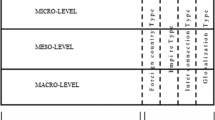Abstract
Globalization of the world economy encourages borderlessness, a phenomenon in which the internationalization of markets diminishes the political, technological, and cultural sovereignty of nation states. As economic globalization progresses, the interdependent relationship it engenders among nations creates friction. Any political solution must be based upon sound economic logic and ethical principles. Post-war history has seen the emergence of two distinct economic systems: Western classical capitalism and the Japanese market economy. By utilizing market efficiency as a criterion for comparison, we see a fundamental difference in the basic elements of these respective systems. Japanese companies prioritize people while their Western counterparts prioritize returns to shareholders. Furthermore, Japanese labor unions are companywide and work within a cooperative model of labor management. Western unions are industry-wide, based upon craft, and work within a confrontational model. These differences are rooted in ideology -- the Japanese, guided by the market principle of competition, favor group oriented activity; while the West, heavily influenced by the class principle, favors individualism. The former produces stronger results, because it is more consistent with economic rationality and ethical ideals.
Access this chapter
Tax calculation will be finalised at checkout
Purchases are for personal use only
Preview
Unable to display preview. Download preview PDF.
Similar content being viewed by others
References
Gill, S. and Law, D. (1988): The Global Political Economy, Perspectives, Problems, and Policies, John Hopkins University Press.
Gilpin, R. (1987): The Political Economy of International Relations, Princeton University Press.
Odawara, K. (1988): “The Competition Principle in Japanese Companies and Labor Unions: A Premise”, in Research in Asian Economic Studies, vol. 1, Part 3, Asian Industrialization: Changing Economic, Structures, ed., M. Dutta, JAL Press Inc., New York.
Odawara, K. (1988): “A Review of Sekai Keizai Hakusho”, ESP, January.
Odawara, K. (1985): “The Competition Principle in Japanese Companies and Labor Unions Based on Competition Principle”, Nihon Keizai Shinbun (Japan Economic Journal), January 31.
Odawara, K. (1983): “The World-wide Structure of Economic Frictions”, in T. Watanabe, and K. Odawara, eds., Kokusai Seiji Keizai-ron (On International Politics and Economics), Chapter 3, Yuhikaku.
Odawara, K. (1984): “The Competition Principle in Japanese Companies and Labor Unions”, Japan Quarterly, 31, No. 1, January-March.
Odawara, K. (1983): “Japanese vs. American-European Companies and Labor Unions: A Comparative Analysis by Competition Principle”, Tuusan Journal (MITI Journal), April.
Odawara, K. (1982): “World Economy and Interdependence”, in K. Odawara and J. Nishikawa, eds., Tekisutobukku Seaki-keizai (A Text Book of World Economics), Chapter 1, Yuhikaku.
Odawara, K. (1980–1981): “Japanese Economic Frictions: Its Reality, Background and Issues”, Okurasho Kanzei Chousa Geppou,October to September.
Odawara, K. (1978): “Some Critiques on the Recent International Economic Problems”, Jochi Keizai-ronshuu (Sophia Economic Review), March.
Editor information
Editors and Affiliations
Rights and permissions
Copyright information
© 1993 Springer Science+Business Media Dordrecht
About this chapter
Cite this chapter
Odawara, K. (1993). Business Ethics in the Global Age. In: Dunfee, T.W., Nagayasu, Y. (eds) Business Ethics: Japan and the Global Economy. Issues in Business Ethics, vol 5. Springer, Dordrecht. https://doi.org/10.1007/978-94-015-8183-7_9
Download citation
DOI: https://doi.org/10.1007/978-94-015-8183-7_9
Publisher Name: Springer, Dordrecht
Print ISBN: 978-90-481-4309-2
Online ISBN: 978-94-015-8183-7
eBook Packages: Springer Book Archive




